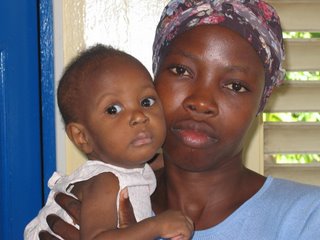
In April we examined a seven month old Haitian girl in the clinic in Port-au-Prince. She only weighed nine pounds and had been having fevers and labored breathing. She was brought to the city by her mother from her home about an hour north of here. Her name is Ferna.
Ferna’s exam revealed a loud murmur over her chest. A murmur is “audible turbulence” from flow of blood through the heart. Some murmurs are considered innocent and others signify real disease. Ferna’s murmur definitely reflected real disease. She also had a fever and crackles in her upper portions of her right lung which most likely meant she had some type pneumonia.
I told Ferna’s mom that she needed to be admitted to the hospital across the street from the clinic. Her mother was very happy to receive the news that her daughter would receive care. However, there was no room in the pediatric section of the hospital, so she and Ferna slept in the hospital courtyard that night and Ferna was admitted the next day.
Her chest x-ray revealed a large heart due to congenital heart disease and her lung fields were filled with an infiltrate that appeared to be tuberculosis.
Several months have passed since Ferna was admitted and she remains in the hospital which is the best place for her in Haiti because she is fed nutritious food prepared in the hospital, gets her medication each day, and her mother gets to visit her. She has been placed on the national Haitian tuberculosis regimen for which is three drugs for two months followed by two drugs for the following six months. Her fevers have abated and she looks some better.
However, her congenital heart disease persists and her echocardiogram performed here in the capital shows a hole in the wall between the lower chambers of her heart which allows too much blood to circulate through her lungs with each heart beat. Therefore, she is taking diuretics to keep her lungs dry.
So now what? Do we successfully treat her tuberculosis and discharge her to her city north of here so she can die from her congenital heart disease that can only be repaired with surgery? If that is the case, why are we treating her tuberculosis so aggressively so she can die from another treatable disease?
Paul Farmer and his colleagues have proven that treatment of multidrug resistant tuberculosis and even HIV is possible to successfully do in resource poor settings, such as Haiti. Treating these hard-to-treat diseases actually improves the general level of care given to poor populations. Who would have predicted this? Would performing heart surgery in Haiti some day increase the overall level of medical care? Extrapolating from Farmer’s research would say that it would.
So if developing world patients receive treatment for HIV and very hard-to-treat tuberculosis, why does Ferna not deserve surgical treatment for the tiny hole in her heart that is wreaking havoc on her circulation and will cause her death? What exactly is the down side to saving Ferna’s life?
I propose that Ferna be operated quickly in the United States. I also propose that no baby in the world should die from a hole in their heart in 2006 due to negligence from the world that has everything. The technology is available and a good repair of a mechanically deficient heart can lead to many good years for the child. With the obscene amount of money spent in the developed world for cosmetics, dog food, cigarettes, and military expenditures, developed countries have no excuse not to operate these children from around the world and set up programs to teach developing world physicians the science of delicate pediatric heart surgery.
I also believe that skilled physicians in the United States that want to perform pro bono surgeries in their medical centers on babies like Ferna should be allowed to do so. Doctors need to do what is right and patching holes in babies that are slowly suffocating is the right thing to do. If Catholic hospital administrators disagree because of medical center costs, they need to figure a way to lower costs.
However, if only one doctor approaches hospital administration regarding operating a child from abroad, he or she can easily be rejected and marginalized. Physicians need to show a united front with the entire pediatric department demanding to treat international cases each year. If administrators disagree, they should be removed from their positions as the Ethical and Religious Directives for Catholic Health Care Services imply (Directive 5). Catholic bishops around the United States need to support these physicians and children like Ferna and not try and just appease the big Catholic Medical Industry in their diocese. The Catholic medical centers need to be challenged to do the right thing and act for the reasons for which they were founded---taking care of the poor who need their care.
The Haitian physicians and medical system are doing their best with Ferna. Her mother now hopes and prays for heart surgery for her baby daughter in the United States. In Haiti, the technology eventually needs to come here for complicated heart surgery that requires bypass. Haitian physicians need to be trained, and Haitian babies need to be operated here in Haiti by Haitian physicians. But in the mean time Ferna is not going to wait for all of us to make this happen.
The clock is ticking. Any advice on what I should tell Ferna’s mother?

No comments:
Post a Comment